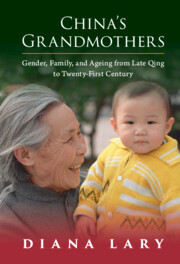Book contents
- China’s Grandmothers
- China’s Grandmothers
- Copyright page
- Dedication
- Contents
- Illustrations
- Tables
- Boxes
- Acknowledgements
- Preface
- Introduction
- 1 Precious Treasures
- 2 Archetypes and Images of Grandmothers
- 3 Baby Seekers/Baby Lovers
- 4 Child Care
- 5 Ruling the Roost
- 6 Old Age
- 7 Grandfathers
- 8 Transmitters of Culture
- 9 Absent Parents
- 10 Left-Behind Children
- 11 The Pleasures of Old Age
- 12 Leaving This Life
- 13 The Future of the Old
- 14 Personal Notes
- Afterword
- Notes
- Bibliography
- Index
5 - Ruling the Roost
Published online by Cambridge University Press: 14 April 2022
- China’s Grandmothers
- China’s Grandmothers
- Copyright page
- Dedication
- Contents
- Illustrations
- Tables
- Boxes
- Acknowledgements
- Preface
- Introduction
- 1 Precious Treasures
- 2 Archetypes and Images of Grandmothers
- 3 Baby Seekers/Baby Lovers
- 4 Child Care
- 5 Ruling the Roost
- 6 Old Age
- 7 Grandfathers
- 8 Transmitters of Culture
- 9 Absent Parents
- 10 Left-Behind Children
- 11 The Pleasures of Old Age
- 12 Leaving This Life
- 13 The Future of the Old
- 14 Personal Notes
- Afterword
- Notes
- Bibliography
- Index
Summary
Grandmothers were household managers. They assigned household duties to their daughters, daughters-in-law and, in wealthier households, servants. They supervised food prepartion for daily meals, and for storerooms. They directed the handcraft work that made households self-sufficient in clothing, bedding and shoes, and taught the younger women handcraft skills. In many parts of China handcrafted goods were produced in the home for the market, including for export. The sales brought in income for the family.
Grandmothers marshalled the preparations for family festivals, notably marriages, and for the many festivals that punctuated the year, most importantly the New Year, which demanded the attendance of the whole family. Grandmothers supervised the preparation of food, clothing and ritual items, for an occasion that cemented the family together. Family celebrations went into abeyance from 1937, through twelve years of war and during the Mao Era. They are now back in full force. Hundreds of millions go home in the run-up to the New Year. For labour migrants the two-week holiday is the only time they spend at home with their children.
- Type
- Chapter
- Information
- China's GrandmothersGender, Family, and Ageing from Late Qing to Twenty-First Century, pp. 71 - 88Publisher: Cambridge University PressPrint publication year: 2022

